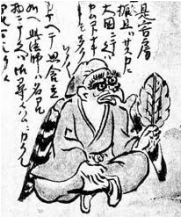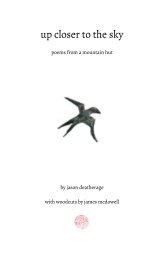
Wu Wei and the Sword
In swordsmanship, one sees the common hackers attacking one another with abandon, fighting sword against sword with little understanding of the deeper principles that will forever be obscure to their cluttered minds. Even those who do not fight are like magpies, collecting shiny forms, practicing poorly and excessively, coveting expensive weapons and costumes, and chattering at each other from the treetops, trying to establish some sort of false dominance over one another. This disgraceful state of affairs is inevitable when the mind is focused only on the Yang, the obvious, the distracting. The foolish are always focused on ‘doing’ something, ‘making’ something happen, being ‘proactive’, ‘taking’ initiative, and being in control of their false view of actual reality that they insist on filtering through their expectations and desires. It is no surprise that they are doomed to remain at low levels of skill and understanding, because their cups are full, with no room to receive the nourishing tea of true reality, of Now.
If one makes the choice to follow nature’s example, to adapt and flow with circumstance as if one is cast into the middle of a wide and powerful river with no hope of reaching shore, then one has a chance to truly begin to Learn and Improve in their pursuit of the essence of swordsmanship. Only by letting go of our desires and expectations can we hope to truly enter the moment that is right here, right now. Since we are a part of reality, we are subject to it in every moment. This reality cannot be changed, only accepted, though do not mistake this for helplessness. If we are in a great river, being swept inevitably downstream, our choices are not simple to swim directly upstream or float helplessly downstream; rather we are best served by working with the current in all of its subtle eddies, undertows, rapids, and calm depths. Only by surrendering to the reality of the river can we begin to understand how we can use its power to assist our movements; we have stopped fighting and ‘doing’ things, and begun to let the river move us, guided by the strategic overview of our mind. In this way we ‘do nothing’ and yet things are accomplished with power and efficiency, leaving no trace behind. In the words of the old Taoists, this is Wu Wei.
In the realm of the sword, when faced with an opponent bent on killing, it is critical that we operate in this state of Wu Wei, ‘doing’ nothing that is unnecessary, allowing the opponent to dictate the movements of our sword and body. The lower level hackers and slashers will sneer derisively at this ‘reactive’ approach, but they fail to understand that this reactivity is in response to true reality itself, rather than their proactivity, which is also essentially reactive but only in response to their projections, fantasies, conjectures and guesses about reality. While one can develop strong predictive powers with training and observation, one must understand that one is always working with false information, and if the guess is wrong, the result is catastrophic. The reactive swordsman can never be faked, while the proactive swordsman is easy to draw into all sorts of terrible positions and cut down with ease. It requires true courage to follow this path, which requires that one Wait and See what the opponent is actually doing rather than guessing at what they might do. By doing this, we are not interfering with reality, but are rather adapting ourselves to it utterly, and using its currents to accomplish our own ends. In this way, one must only Wait, and the proper course of action will become immediately clear, assuming one has trained their martial vocabulary diligently. Only by Waiting, just as the universe itself waited to be born out of the Big Bang, can this unlimited potential give rise to the correct action spontaneously and naturally.
This natural spontaneity was the central pursuit of the old Taoists, before their philosophies were hijacked and twisted by the alchemists, priests, and magicians. Their pursuit was the direct opposite of the immortality that later ‘Taoists’ became known for coveting; it was instead the immediate and direct experience of each moment, naturally and spontaneously, which is the mirror image of immortality. Their Way meant that each moment was a whole incarnation unto itself, and each choice lead to the next incarnation in the next moment, in constant succession until one’s death, which was accepted with no more or less joy or sorrow than life itself.
By seeing what is desirable and obvious, we can see that there must be another side to things. By operating in these dark spaces between things, the swordsman begins to be able to swim with the river by flowing with Yin. By using what is not-sword, one begins to have fine and subtle mastery over what is-sword. By not doing what others do, we begin to be able to do what they cannot, precisely because they are trying to do it so hard.
In swordsmanship, one sees the common hackers attacking one another with abandon, fighting sword against sword with little understanding of the deeper principles that will forever be obscure to their cluttered minds. Even those who do not fight are like magpies, collecting shiny forms, practicing poorly and excessively, coveting expensive weapons and costumes, and chattering at each other from the treetops, trying to establish some sort of false dominance over one another. This disgraceful state of affairs is inevitable when the mind is focused only on the Yang, the obvious, the distracting. The foolish are always focused on ‘doing’ something, ‘making’ something happen, being ‘proactive’, ‘taking’ initiative, and being in control of their false view of actual reality that they insist on filtering through their expectations and desires. It is no surprise that they are doomed to remain at low levels of skill and understanding, because their cups are full, with no room to receive the nourishing tea of true reality, of Now.
If one makes the choice to follow nature’s example, to adapt and flow with circumstance as if one is cast into the middle of a wide and powerful river with no hope of reaching shore, then one has a chance to truly begin to Learn and Improve in their pursuit of the essence of swordsmanship. Only by letting go of our desires and expectations can we hope to truly enter the moment that is right here, right now. Since we are a part of reality, we are subject to it in every moment. This reality cannot be changed, only accepted, though do not mistake this for helplessness. If we are in a great river, being swept inevitably downstream, our choices are not simple to swim directly upstream or float helplessly downstream; rather we are best served by working with the current in all of its subtle eddies, undertows, rapids, and calm depths. Only by surrendering to the reality of the river can we begin to understand how we can use its power to assist our movements; we have stopped fighting and ‘doing’ things, and begun to let the river move us, guided by the strategic overview of our mind. In this way we ‘do nothing’ and yet things are accomplished with power and efficiency, leaving no trace behind. In the words of the old Taoists, this is Wu Wei.
In the realm of the sword, when faced with an opponent bent on killing, it is critical that we operate in this state of Wu Wei, ‘doing’ nothing that is unnecessary, allowing the opponent to dictate the movements of our sword and body. The lower level hackers and slashers will sneer derisively at this ‘reactive’ approach, but they fail to understand that this reactivity is in response to true reality itself, rather than their proactivity, which is also essentially reactive but only in response to their projections, fantasies, conjectures and guesses about reality. While one can develop strong predictive powers with training and observation, one must understand that one is always working with false information, and if the guess is wrong, the result is catastrophic. The reactive swordsman can never be faked, while the proactive swordsman is easy to draw into all sorts of terrible positions and cut down with ease. It requires true courage to follow this path, which requires that one Wait and See what the opponent is actually doing rather than guessing at what they might do. By doing this, we are not interfering with reality, but are rather adapting ourselves to it utterly, and using its currents to accomplish our own ends. In this way, one must only Wait, and the proper course of action will become immediately clear, assuming one has trained their martial vocabulary diligently. Only by Waiting, just as the universe itself waited to be born out of the Big Bang, can this unlimited potential give rise to the correct action spontaneously and naturally.
This natural spontaneity was the central pursuit of the old Taoists, before their philosophies were hijacked and twisted by the alchemists, priests, and magicians. Their pursuit was the direct opposite of the immortality that later ‘Taoists’ became known for coveting; it was instead the immediate and direct experience of each moment, naturally and spontaneously, which is the mirror image of immortality. Their Way meant that each moment was a whole incarnation unto itself, and each choice lead to the next incarnation in the next moment, in constant succession until one’s death, which was accepted with no more or less joy or sorrow than life itself.
By seeing what is desirable and obvious, we can see that there must be another side to things. By operating in these dark spaces between things, the swordsman begins to be able to swim with the river by flowing with Yin. By using what is not-sword, one begins to have fine and subtle mastery over what is-sword. By not doing what others do, we begin to be able to do what they cannot, precisely because they are trying to do it so hard.

 RSS Feed
RSS Feed

